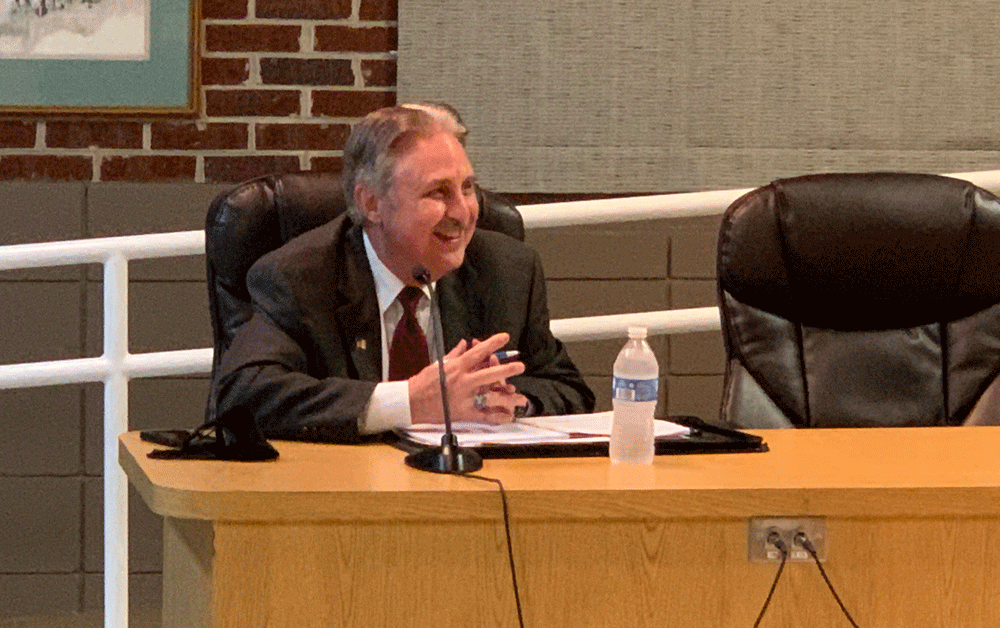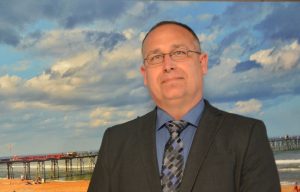
The Flagler Beach City Commission this evening voted to hire William Whitson, a seasoned veteran of city management looking to finish his career in Florida, as its next city manager. The vote was unanimous. The decision followed little discussion at the end of a two hour and 40 minute workshop and meeting.
Commissioners initially voted 4-2 for Whitson, with Mayor Linda Provencher and Commissioner Deborah Phillips opting for Dru Driscoll. but when Commissioner Rick Belhumeur motioned to hire Whitson and Commissioner Ken Bryan seconded, the vote was unanimous. The commission needed at least four votes to hire the manager.
Whitson, who’d been an assistant city manager in Port Orange for eight years–Ken Parker, his former boss, coordinated Flagler Beach’s manager search–is currently a local government consultant in Texas. He replaces the late Larry Newsom, who died in August.
Whitson’s style and personality, if not his career path and sense of humor, could often evoke that of Newsom, and may have played a strong role in the decision of a commission that had grown to depend on Newsom’s command of local and state issues. Whitson could also address issues cogently and analytically, whether discussing parks, developers or tax revenue. Asked about the importance of a city’s parks, he said: “Your parks are your image. It’ll tell the rest of the world who you think you are.”
What stood out, especially in contrast with his closest competitor, was Whitson’s self-assurance. He spoke as a “government person” who “loves government, loves public service,” wasn’t apologetic about it (he described the city’s water and sewer plant as “the bones of the community”), and wasn’t a whit insecure about his abilities, his standing or his limitations. He did not hesitate to speak to the commission on an equal basis, or to speak of powerful interests the same way.
“I want a place that I can call home and that wants me and what I can do as a professional for the community,” he said.
Developers? “Developers are great folks when they want to do something. I found you have them put it in writing and hold them to it,” he said. He applied Ronald Reagan’s statement about the Soviets to developers: “You trust but you verify and you put everything in writing.” He then modulated his statement: “They have to make money you want to see them be successful, otherwise if they go bankrupt all the bills go back your way.” But, he said, “you have to negotiate hard and put it in writing, because if it’s not in writing, it doesn’t exist.”
Grants are wonderful, he said, but “some federal grants aren’t worth the paper they’re written on.” At the same time, the city is entitled to get its “fair share.” But he said he’d hire a firm to chase after grants. He canl;t do it in house. “I don’t have enough time,” he said.
On preserving the city’s small-town appeal, Whitson said “people right up and down I-95 they come here and they’re going to continue to come here.” He cited the city’s famed July 4 events as an example. The key, he said, is to not go too fast to support growth, enabling that with sound infrastructure–roads, utilities (he’d been at the city’s utility for a visit today).
Fifty-seven candidates had applied. Whitson was one of two finalists. The other was Dru Driscoll, currently a deputy city manager in Daytona Beach, and the city’s fire chief. Each was interviewed for an hour this evening.
It was the two candidates’ second public interview with the full commission. Their earlier interviews took place by zoom two weeks ago. Since then they’ve each interviewed individually with the commissioners. Tonight Driscoll was interviewed first, sitting at the city manager’s desk below and perpendicular to the the commission’s dais, while Whitson waited, segregated in a back room so he wouldn’t hear the questions.
For this round, commissioners had solicited questions from residents. They received some three dozen. Some of the questions were more suitable for political candidates, Commission Chair Jane Mealy said, some were inappropriate, and some were legitimate, but given the number, had to be pared down to a more manageable number. Commissioners spent the first segment of the meeting deciding which questions to ask and which not.
A few of the questions that made it–for example–had to do with diversifying revenue sources, balancing natural preservation against urban sprawl, whether the candidate has ever worked for or consulted with developers. what they think of improving the city’s water and sewer system. Questions that didn’t were too broad (how would Flagler Beach prepare for climate change, whether to survey residents about potentially consolidate fire and police services with the county), require too much local knowledge (what to do with the bank building or making the pier financially viable) or were too solipsistic (a resident wanted to now when his or her street would be paved).

At the same time, Driscoll’s personality is more amiable where Whitson’s is forceful, it is more accommodating where Whitson’s is commanding, and it’s still a bit more fawning where Whitson’s is self-assured. Put another way, Whitson didn’t come across as if he were seeking anyone’s approval. He was just seeking a job. Driscoll wanted the job–and he wanted approval. To profile himself, he’d set up a website just for his Flagler Beach application, illustrating it with his portrait, quotes and what he calls his leadership philosophy. He may have felt that to be necessary considering the thinness of his resume–all told, a one-page document and the shortest resume of any recent candidate to make the shortlist for a top local government job.
Even Driscoll recognized Whitson’s advantages. He has “more years of experience than myself,” Driscoll said of his competitor, before going even further to diminish his case: “I know I shouldn’t say it,” he said, but narrowing down the choices to himself and Whitson “is a testament to the city of Flagler Beach that you see what is important to you.”
Driscoll’s opening statement reflected his tendency to undercut himself with self-deprecation that sounded more like insecurity. He said he’d never before applied to be a city manager before and that Flagler Beach was his first try. The reason: “I’ve never seen myself as a city manager,” he said, startlingly. “I want to clarify that,” he added, explaining that in his 22-year experience in Daytona Beach he’s always been a “boots-on-the-ground” sort of person.
But he soon illustrated his approach by detailing his priorities or answering such specific questions about his ideas regarding the proposed hotel that would be built in the heart of town, in place of the old farmers’ market–and where a hotel stood for decades before the 1970s. To that, he said his opinion doesn’t matter. “I am the boots on the grounds that get things moving,” he said. But he said he found the proposed hotel “complementary” to the community’s small-town feel. “It is not intrusive,” he said. “It would not only bring more identity to Flagler Beach and who you are–I won’t say we–I thin it is helpful for that,” he said, once again subtly, unwittingly telegraphing his insecurity with that “I won’t say we.”
Asked if he’d entertain ideas of burying power lines, he said it would be “well worth exploring,” but didn’t venture further. “There’s a price tag that comes with it, and you hold the purse strings.” Whitson answered more precisely. He knew the price tag (“it’s about a million a mile”) and he cited an example of a city that took on the initiative, but did it very slowly.
To diversify revenue sources away from dependence on property taxes, he said he likes “free money,” meaning money from grants. Whitson was again more precise: “Grants are wonderful, he said, but “some federal grants aren’t worth the paper they’re written on, he said.” At the same time, the city is entitled to get its “fair share.” But Whitson said he’d hire a firm to chase after grants. He can’t do it in house. “I don’t have enough time,” he said.
Driscoll spoke of The Gardens, the planned development along John Anderson Highway, and said annexation of that development–currently in unincorporated Flagler–could bring revenue. He spoke accommodatingly of developers, seeing them as an engine of economic development, and spoke more generally on capitalizing on “a technology hub,” using the city’s old bank building to that end, though he did not explain how–or what would go in that building.
When it was time for Driscoll to close, his speech sounded more like a valedictory. He knew he was out.
“When I set out on this personal journey, it was outside of the box for me,” he said. He’s enjoyed his work in Daytona Beach. “It was hard to actually put my name in the hat, not knowing where I stood, understanding that there’d always be candidates superior to me out there.” He said it’s always been the case in his career: he’s always been the youngest this, the youngest that. He described his application as “one for personal growth, but also one for personal enjoyment,” and that it was worth the commission’s “curiosity.” He ended on a metaphorical farewell, telling the commission that “if today the price is not right,” he still intended to move to the city, and would be “down the street” if commissioners wanted to seek him out.
Whitson for his closing repeated what he’d said in his previous public interview: “I’m sold.” he asked rhetorically whether he was the right person to solve the city’s challenges. He said he thought he had the right experience, and would uniquely “dig in and do the hard work that it takes to do this job” with honesty and options. “I’ll never demand. I would always let you choose,” he said.
All the candidates running in the city’s March 3 election but one were present–Kim Carney and Suzy Johnston, who are running for mayor, and Paul Harrington, who is challenging Eric Cooley for that commission seat. All three said they approved of the commission’s choice. Pat Quinn, a mayoral candidate, was absent.
![]()
The sound in Wednesday’s candidate interviews on the city’s YouTube channel was fitful, working only about 75 percent of the time:
Click to access Whitson-William-R..pdf





























Dave Sullivan says
Good Luck William Whitson! Look forward to meeting you and working together to keep Flagler Beach and the County the great place it is.
Dave Sullivan, Flagler County Commissioner District 3
Ramone says
Hopefully the Council has researched his background and previous employers. A quick internet search of Cairo Ga, East Ridge Tenn, City of Hapeville Ga, revealed some issues that if I were hiring him I’d want to ask him about.
tom dooley says
hey ramone my wife and I did a google research on him too. What did you find that we didn’t? because some people in hapeville said he wouldn’t allow him to have a bar there? so now he’s a racist? besides that what else did you find? normal cm stuff? can’t please everyone kinda of like being president. people gotta complain no matter what they do. so what else do you have? thats all we could find except normal bs from the citizens like you. sounds like a good candidate for fb as far as my wife and are or concerned. leadership skills,etc.
Say No says
I guess we should have done the research as Ramone suggested?
Lance Carroll says
Best wishes to Mr. Whitson and the citizens of Flagler Beach. May the aggregate see strong leadership and positive results.
Sincerely,
Lance Carroll